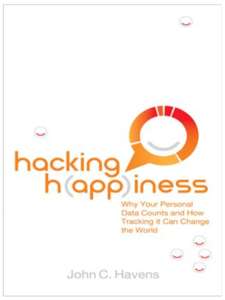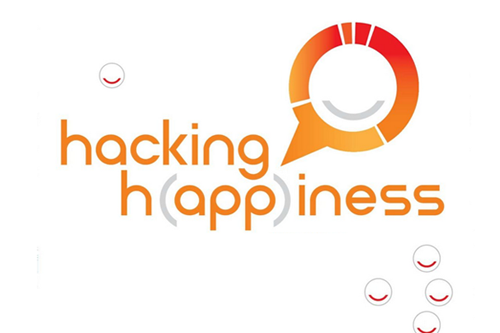 John C. Havens is a regular contributor to Mashable.com, where he has written a number of viral articles about online privacy, augmented reality, and the importance of a “happiness” economy that measures the full measure of well-being and not just profits and loss. He is a popular speaker at TED forums and technology expos and a terrific harmonica player (click here to hear for yourself). And with the publication of his book Hacking Happiness: Why Your Personal Data Counts and How Tracking it Can Change the World
John C. Havens is a regular contributor to Mashable.com, where he has written a number of viral articles about online privacy, augmented reality, and the importance of a “happiness” economy that measures the full measure of well-being and not just profits and loss. He is a popular speaker at TED forums and technology expos and a terrific harmonica player (click here to hear for yourself). And with the publication of his book Hacking Happiness: Why Your Personal Data Counts and How Tracking it Can Change the World (Tarcher), he has become an evangelist for high-tech’s power to transform the world.
We all know how much money Facebook, Amazon, Google, Twitter and other gigantic consumer, search, and social media enterprises make from the personal data we give them for free. Havens argues that not only do we have the right to make money from our personal data but that our data can and should be used to do much more for us than just sell us things. It can make us healthier, both physically and mentally; it can enable and encourage our altruism; it can make our communities more nurturing; and it can promote our happiness. It can help turn us into better, more caring people.
“I would love to live in a world in which communities are stronger and corporations less exploitative, in which technology becomes a positive force for good. But what really inspires me is a vision of people unhooking their devices and attending to the people they interact with—listening, really listening to “the still small voice” that no electronic sensor is subtle enough to hear.” Thanks to technology, we no longer have to depend on our subjective sense of how we’re feeling to know we’re doing—we can strap sensors to our bodies that collect our vital signs, upload them and analyze them, and report back to us. Our smartphones can measure our heart rates to tell us if we’re attracted to someone we’re on a date with; they can count our restroom breaks and warn us if we seem to be going too often. We can know as much as or more about ourselves than the nurses in intensive care wards know about their patients. In the not-too-distant future, Havens says, our phones will become even more proactive, taking on the roles of life coaches and spiritual advisers. Let’s say you pass a McDonald’s at lunchtime. “As your coach knows your health issues regarding cholesterol, it adjusts the route of your self-driving car to the nearest Whole Foods…Likewise, cameras in a subway car utilizing facial recognition technology might scan the face of a woman who is four months pregnant and send you a text to give her your seat.”
Imagine a world in which you are measured and judged not by how much money and power you have but on how much social capital you create. Imagine a world in which altruism and money have converged as units of exchange. Someone lets you cut in front of him in line at Starbucks and “you nod your head using the Starbucks app for [your Google glasses] “and the person behind you gets [her] coffee for free,” Havens says. “You may feel remorse when you don’t recycle all your plastic bottles. How about life-tipping the homeless woman making three dollars a day pushing a broken shopping cart….You don’t need to look the other way when she smiles at you now—she’s providing a service you don’t have time to do. Smile back and life-tip her.”
If Havens has his way, Hacking H(app)iness will be just the tip of the iceberg. Above and beyond the book, there’s the H(app)athon Project, which uses workshops, online surveys, and a sensor-driven smartphone app that will “help people take a measure of their lives based on worth versus wealth….[and] gain insights on how to change behaviors that are inhibiting [their] happiness.” I tried to download the app and found out that it’s not quite ready, though it should be by year’s end. Once it is, Havens says, it will provide a “global mood ring for the world” that portrays real-time holistic happiness data to help policymakers shape their decisions.
I would be lying if I didn’t acknowledge that a lot of this rubs me the wrong way. I don’t disagree with the idea that e-altruism is better than e-commerce or that self-knowledge is better than obliviousness—they are, of course. I would love to live in a world in which communities are stronger and corporations less exploitative, in which technology becomes a positive force for good. But what really inspires me is a vision of people unhooking their devices and attending to the people they interact with—listening, really listening to “the still small voice” that no electronic sensor is subtle enough to hear.
Even so, if you are reading these words, there may well be something in this book for you. You are online, so you’re not intimidated by or disapproving of technology. And since you’re reading an article at RewireMe.com, you’re interested in self-exploration, inspiration, and transformation.
Havens confesses that he once planned on going to seminary and becoming a minister. In a very real way, he has.




1 Comment
John C. Havens
Hi Arthur,
Just wanted to say thank you for such a thoughtful and insightful review of my book. I especially love your last quote about listening to “the still small voice.” I find that more and more challenging to do, especially in regards to my relationship with technology. But I’m trying, and being grateful is something I know increases wellbeing. So, that said – I’m genuinely grateful that you took the time to read/review the book.
Warm regards,
JCH